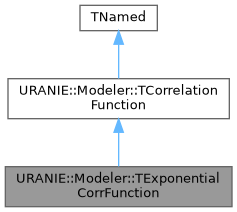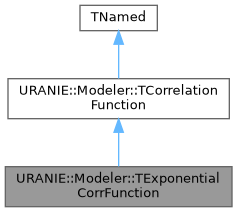Documentation / Manuel développeur
Modules disponibles
Calibration, DataServer, Launcher, MetaModelOptim, Modeler, Optimizer, ReLauncher, Reliability, ReOptimizer, Sampler, Sensitivity, UncertModeler, XmlProblem, |
Uranie / Modeler
v4.10.0
|
Description of the class TExponentialCorrFunction. More...
#include <TExponentialCorrFunction.h>


Public Member Functions | |
Constructor and Destructor | |
| TExponentialCorrFunction (Int_t nbDim, Double_t *p=NULL, Double_t *corrLength=NULL) | |
| Default constructor. More... | |
| virtual | ~TExponentialCorrFunction () |
| Default destructor. More... | |
Get and Set methods | |
| Double_t * | getPower () |
| virtual void | setParameters (Double_t *newParams) |
| Sets the parameters of the exponential correlation function. More... | |
| void | setPower (Double_t *p) |
| Sets the power parameter. More... | |
| void | setCorrLengths (Double_t *corrLength) |
| Sets the correlation lengths. More... | |
Tools | |
| virtual TCorrelationFunction * | clone () |
| Return a clone of the correlation function. More... | |
| virtual void | eval (Int_t n1, Double_t *x1, Int_t n2, Double_t *x2, Double_t *C) |
| Compute the correlation between x1 and x2. More... | |
Printing Log | |
| virtual void | printLog (Option_t *option="") |
 Public Member Functions inherited from URANIE::Modeler::TCorrelationFunction Public Member Functions inherited from URANIE::Modeler::TCorrelationFunction | |
| TCorrelationFunction () | |
| Default constructor. More... | |
| virtual | ~TCorrelationFunction () |
| Default destructor. More... | |
| Int_t | getNParameters () |
| Return the number of parameters of the correlation function. More... | |
| Int_t | getNDimensions () |
| Return the number of dimensions of the input space. More... | |
| Int_t | getNCorrLengths () |
| Return the number of correlation lengths. More... | |
| Double_t * | getParameters () |
| Returns an array containing the parameters of the function. More... | |
| Double_t * | getCorrLengths () |
| Returns an array containing only the correlation lengths. More... | |
| void | setLog () |
| void | unsetLog () |
| void | changeLog () |
| Bool_t | getLog () |
Public Attributes | |
| Double_t * | _lPower |
| array of power coefficients More... | |
 Public Attributes inherited from URANIE::Modeler::TCorrelationFunction Public Attributes inherited from URANIE::Modeler::TCorrelationFunction | |
| Bool_t | _blog |
| Boolean to decide if the log information is shown or not. More... | |
| Double_t * | parameters |
| array containing the values of the function parameters. Correlation lengths are stored last. More... | |
| Double_t * | _lCorrLengths |
| array containing only the correlation lengths. More... | |
| Int_t | nbDimensions |
| number of dimensions of the input space More... | |
| Int_t | nbParameters |
| total number of parameters More... | |
| Int_t | nbCorrLengths |
| number of correlation lengths More... | |
Detailed Description
Description of the class TExponentialCorrFunction.
This class defines the shape of the correlation between two sets of variables as the function:
\[\exp\left(-\left|\frac{x1-x2}{lc}\right|^p \right)\]
where \(lc\) is the correlation length and \(p\) is the power. If \(p = 2\), the function is equivalent to the Gaussian correlation function.
Constructor & Destructor Documentation
◆ TExponentialCorrFunction()
| URANIE::Modeler::TExponentialCorrFunction::TExponentialCorrFunction | ( | Int_t | nbDim, |
| Double_t * | p = NULL, |
||
| Double_t * | corrLength = NULL |
||
| ) |
Default constructor.
- Parameters
-
nbDim (Int_t): number of dimension of the input variables
p (Double_t*): array of the power coefficients (size: nbDim). If NULL, the power coefficients are initialised to 1.0. (default = NULL). corrLength (Double_t*): array of the correlation lengths for the function (size: nbDim). If NULL, the correlation lengths are initialised to 0.1. (default = NULL).
Referenced by ClassImp().
◆ ~TExponentialCorrFunction()
|
virtual |
Default destructor.
Referenced by ClassImp().
Member Function Documentation
◆ clone()
|
virtual |
Return a clone of the correlation function.
The clone must be destroyed by the object (or user) calling the function.
Implements URANIE::Modeler::TCorrelationFunction.
Referenced by ClassImp().
◆ eval()
|
virtual |
Compute the correlation between x1 and x2.
The order of the indices in the flat arrays are the following: x[i+j*d] = X[i,j] where X is a matrix of size (d x n), i is the line index, and j the column index. The results are stored in the flat array C.
- Warning
- Be aware that the matrix corresponding to flat arrays x1 and x2 have input dimensions as LINE, not columns. This means that for a set of point {(a1,b1),(a2,b2),(a3,b3)}, the corresponding matrix X will be: \( \left( \begin{array}{ccc} a1 & a2 & a3 \\ b1 & b2 & b3 \end{array} \right) \)
and the corresponding flat array x = {a1,b1,a2,b2,a3,b3}.
- Parameters
-
n1 (Int_t): number of elements of x1 x1 (Double_t*): data set x1 represented as a flat array (size: d * n1) n2 (Int_t): number of elements of x2 x2 (Double_t*): data set x2 represented as a flat array (size: d * n2) C (Double_t*): correlation matrix represented as a flat array (size: n1 * n2)
- Exceptions
-
UErrorExceptions if the gpLib function returns 1 (evaluation failed)
Implements URANIE::Modeler::TCorrelationFunction.
Referenced by ClassImp().
◆ getPower()
|
inline |
References _lPower.
◆ printLog()
|
virtual |
Reimplemented from URANIE::Modeler::TCorrelationFunction.
Referenced by ClassImp().
◆ setCorrLengths()
|
virtual |
Sets the correlation lengths.
- Parameters
-
corrLength (Double_t*): array containing the correlation length parameter. If the number of dimension of the inputs is \(nbDim\), the array's size is \(nbDim\).
Implements URANIE::Modeler::TCorrelationFunction.
Referenced by ClassImp().
◆ setParameters()
|
virtual |
Sets the parameters of the exponential correlation function.
- Parameters
-
newParams (Double_t*): array containing the parameters of the correlation function. If the number of dimension of the inputs is \(nbDim\), the array's size is \(nbDim*2\). It is supposed to be of the form: \[ newParams[nbDim*2] = {p[0],..., p[nbDim-1], lc[0],..., lc[nbDim-1]} \]
where \(p\) is the power parameter (array of size \(nbDim\)) and \(lc\) is the correlation length parameter (array of size \(nbDim\)).
Implements URANIE::Modeler::TCorrelationFunction.
Referenced by ClassImp().
◆ setPower()
| void URANIE::Modeler::TExponentialCorrFunction::setPower | ( | Double_t * | p | ) |
Sets the power parameter.
- Parameters
-
p (Double_t*): array containing the power parameter. If the number of dimension of the inputs is \(nbDim\), the array's size is \(nbDim\).
Referenced by ClassImp().
Member Data Documentation
◆ _lPower
| Double_t* URANIE::Modeler::TExponentialCorrFunction::_lPower |
array of power coefficients
Referenced by ClassImp(), and getPower().


